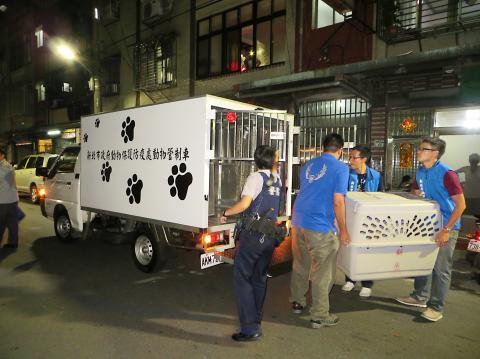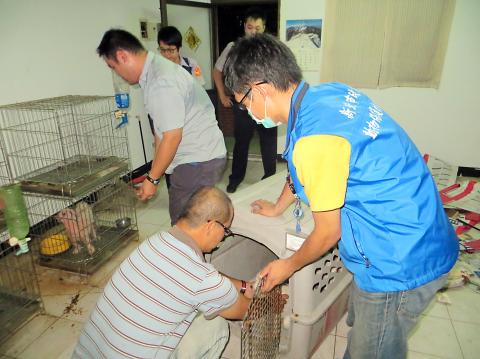On July 17 the New Taipei City Animal Protection and Health Inspection Office, acting in conjunction with animal protection police, seized 27 dogs in a 20 ping (66 m2) attic in New Taipei City’s Lujhou District. The dogs’ vocal cords had been cut so that they could not bark loudly, and they were all shut in cages in a sultry room that reeked of a foul odor.
The animal protection office had received reports from members of the public about an illegal building on Alley 22 of Guanghua Road in Lujhou District holding a large number of dogs and emitting a bad smell. Investigations revealed that it was an illegal breeding facility run by a nearby pet store. On the afternoon of July 17, in conjunction with animal protection police from the Lujhou District Precinct, the animal protection office inspected the pet store and its illegal breeding facility and seized eight male and 19 female dogs, including one pregnant bitch, along with other evidence of breeding. After the inspectors showed the apartment property records to the pet store owner, whose surname is Chen, he admitted that he was the owner of the dogs. The animal protection office then issued an on-the-spot ticket imposing a fine of NT$50,000 for violations of Article 25.1 and Article 5 of the Animal Protection Act. The 27 dogs were confiscated and taken back to the animal protection office for rehoming, thus putting an end to this illegal breeding business.
When animal protection officers took the dogs back to their office, the dogs started lapping water thirstily as soon as they saw it. Under examination, the dogs’ fur was found to be knotted, and some dogs’ fur had almost entirely fallen out because of skin disease. Their overall health condition was very poor. Chen Yuan-chuan, director of the Animal Protection and Health Inspection Office, said that the dogs would first be placed in the municipal animal shelter in Banciao District. Once their health condition was determined, they would be neutered by a veterinarian and put up for adoption by members of the public, he said.

Photo courtesy of the New Taipei City Animal Protection and Health Inspection Office
照片由新北市政府動物保護防疫處提供
(Liberty Times, translated by Zane Kheir)
新北市政府動物保護防疫處七月十七日會同動保警察在蘆洲區一處二十坪的頂樓加蓋查獲二十七隻被割除聲帶無法大聲吠叫的狗關在鐵籠內,現場悶熱飄散惡臭。

Photo courtesy of the New Taipei City Animal Protection and Health Inspection Office
照片由新北市政府動物保護防疫處提供
動保處接獲民眾通報,蘆洲區光華路二十二巷內有一處違章建築,因飼養大量狗造成環境惡臭,調查後發現是附近寵物店經營的非法繁殖場。七月十七日下午,動保處會同蘆洲分局動保警察稽查該家寵物店及違法繁殖場,當場查獲八隻公狗及十九隻母狗,包含一隻懷孕母狗等繁殖事證。陳姓業者在稽查人員出示公寓產權資料後,坦承狗是他所飼養,動保處人員當場依違反動保法第二十五之一條及第五條開罰五萬元並沒入二十七隻狗帶回動保處安置,斷絕非法繁殖販賣。
動保處人員將狗帶回,狗兒一看到水拚命喝,檢查時發現狗毛打結,有些甚至因皮膚病快掉光,健康狀況十分不佳。動保處處長陳淵泉表示,狗兒先安置在板橋區動物之家,確定健康狀況後,由獸醫師進行絕育手術,再開放民眾認養。
(自由時報記者何玉華)

It graced statues, colored coffins, and decorated artifacts. It is Egyptian blue, the world’s oldest-known synthetic pigment born in ancient Egypt. Despite its name, it is not limited to a single hue. It ranges from deep blue to greenish tones, often glowing with an almost unearthly brilliance. __1__ In response, the ancient Egyptians developed a synthetic alternative. Not only was it visually striking, but it was also more affordable than imported indigo or natural lapis lazuli. Traces of the pigment have been discovered far beyond Egypt, from wall paintings in Pompeii to tiles in Mesopotamia. However, Egyptian blue began to fall

Bilingual Story is a fictionalized account. 雙語故事部分內容純屬虛構。 Just yesterday, the boy had helped hang the lucky red couplets. Tonight, as firecrackers signaled the New Year, he lay in bed burning with a surging fever. The herbalist checked the boy’s pulse and went still. “The only cure is in the county town across the mountains,” he said. “But the snow is deep, and the shops are shuttered until the Fourth Day.” The boy’s father looked at the window. “I will go.” “The roads are impassable for a cart,” the herbalist warned. “And too far for a man on foot.” The concerned neighbor

Contrary to popular belief, glass bottles may pose a greater microplastic risk than plastic ones. A recent study found that beverages stored in glass bottles can contain up to 50 times more microplastic particles than those in plastic containers. Researchers traced most of the contamination to the paint on the outside of the metal caps. The particles found in the drinks matched the cap’s coating in both color and composition. Experts suggest the issue may result from microscopic scratches that form as caps rub against each other during transport or storage. Such scratches can damage the painted coating, leading

Many animals spend the winter in a deep, low-energy state known as “hibernation.” When food becomes scarce and cold conditions drain body heat, bats, hedgehogs, and some ground squirrels retreat to safe shelters. Their bodies slow down to save energy: heart rates drop, breathing becomes shallow, and body temperature falls. Plenty of preparation goes into hibernation. Shorter days and falling temperatures provoke these animals to eat more and store fat, which sustains the brain and other organs. Inside the body, hormones guide this seasonal change, triggering specific behavior and switching the system to energy-saving mode. Hibernation is not the only winter survival